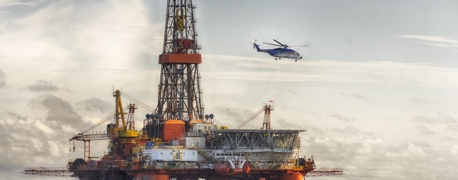How Offshore Workers Communicate with Loved Ones

Did you know? Before the Internet became widespread, offshore oil rig workers could only call home once a week for 6 minutes at a time! Communication was limited to a two-way radio and daily reports, virtually cutting off the crew from the shore. Now, with the advent of WiFi and cellular communications, workers often have several options to stay connected to their loved ones on land.
These new communication options, too, have improved productivity aboard offshore oil rigs and allowed for a better connection between the data on the rig and the decision-makers on the shore.
The most common communication tools used between offshore oil rigs and onshore companies are:
- Satellite communication
- Cell phones, using signal boosters
- Wi-Fi, for video conferencing and email
But workers on the offshore oil rig need ways to communicate with each other, too. In such a noisy and hazardous environment, proper communication is paramount. Offshore workers can use wireless rig intercoms to talk not only with their fellow crew members, but with those on nearby rigs as well.
Can You Use Cell Phones on an Oil Rig?
Technically, it is possible to access cellular services at some locations offshore. The Gulf of Mexico, for example, has towers installed offshore in strategic locations to allow offshore rigs and platforms to communicate with those onshore. However, many companies and local laws prohibit the use of personal phones and other smart devices. Even in situations where they are allowed, a worker doesn’t necessarily have free rein to use a cell phone while on the rig.
An offshore worker cannot use a cell phone aboard an oil rig or platform in these situations:
- Outside of the living quarters. Due to the risk of flammable gas coming up the oil well, the use of cell phones is strictly prohibited anywhere outside of the living quarters.
- To take photos. Due to the sensitive nature of oil rig work and safety concerns of using a phone around the oil and equipment, employees may not take photos of the operations.
- While on the clock. Cell phones are distracting! Working on an offshore oil rig requires the full attention of the employee for their safety and that of their coworkers.
Safety concerns are among the most important reasons why cell phones may not be used in certain situations aboard an oil rig. In fact, for any type of digital equipment like cameras to be used in the work area, a hot work permit must be opened prior to use. These permits often expire at the end of each shift.
Can Family Members Call Workers on an Oil Rig?
If personal cell phones are allowed on the oil rig a family member is trying to contact, they may be able to communicate with a worker with text messages or phone calls. As more and more companies adopt the use of satellite hotspots, workers can stay in touch with their families more easily even in the most remote waters. This is especially beneficial for offshore workers who are away for extended periods of time.
Can You Video Call on an Oil Rig?
Video conferencing is one of the most widely used communication methods between offshore sites and their onshore counterparts. This option decreases decision-making time and allows teams to work within tight deadlines and budgets and even manage multiple projects at once.
For personal use, video calls may be possible on rigs with Internet connection, but similar to phone calls, using video apps like Skype or FaceTime is often limited to living quarters for safety reasons. This allows workers to stay even more connected with friends and family, ensuring they’ll be present for important occasions, even from afar.
How Does Mail Get Delivered to Someone on an Oil Rig?
Although oil rigs are often miles offshore, sending mail to someone on board isn’t much more complicated than mailing something to their home. All you’ll need to know is the address of the shore base for the rig; the team there will take care of transporting the mail to the rig at the next available opportunity, often by boat or helicopter.
Communicating with Offshore Workers
Not only do these improved communication options allow workers to stay in touch with family and friends back home while they are aboard an offshore oil rig, but they also improve their work-life balance while they are away. As communication becomes clearer between an oil rig and the shore, the quality of life of offshore workers and their families only increases.


